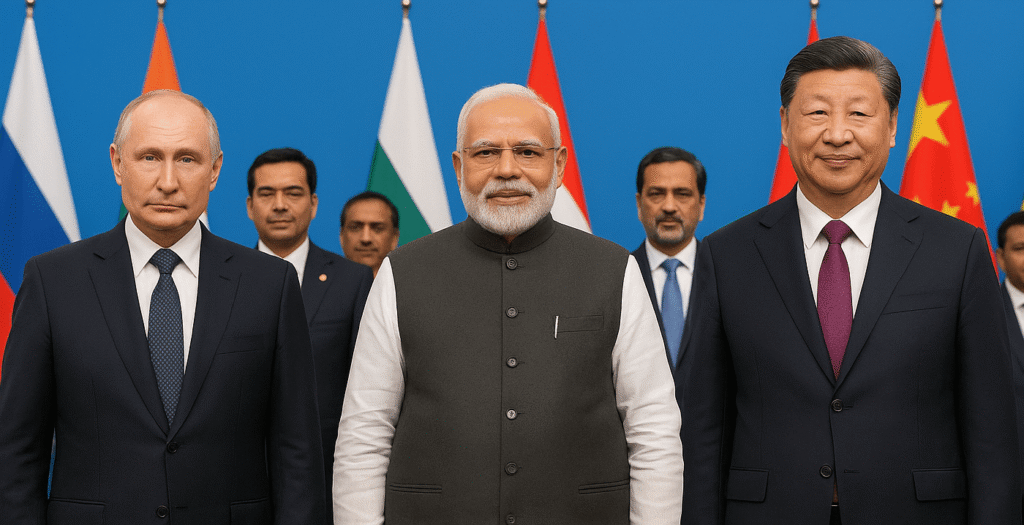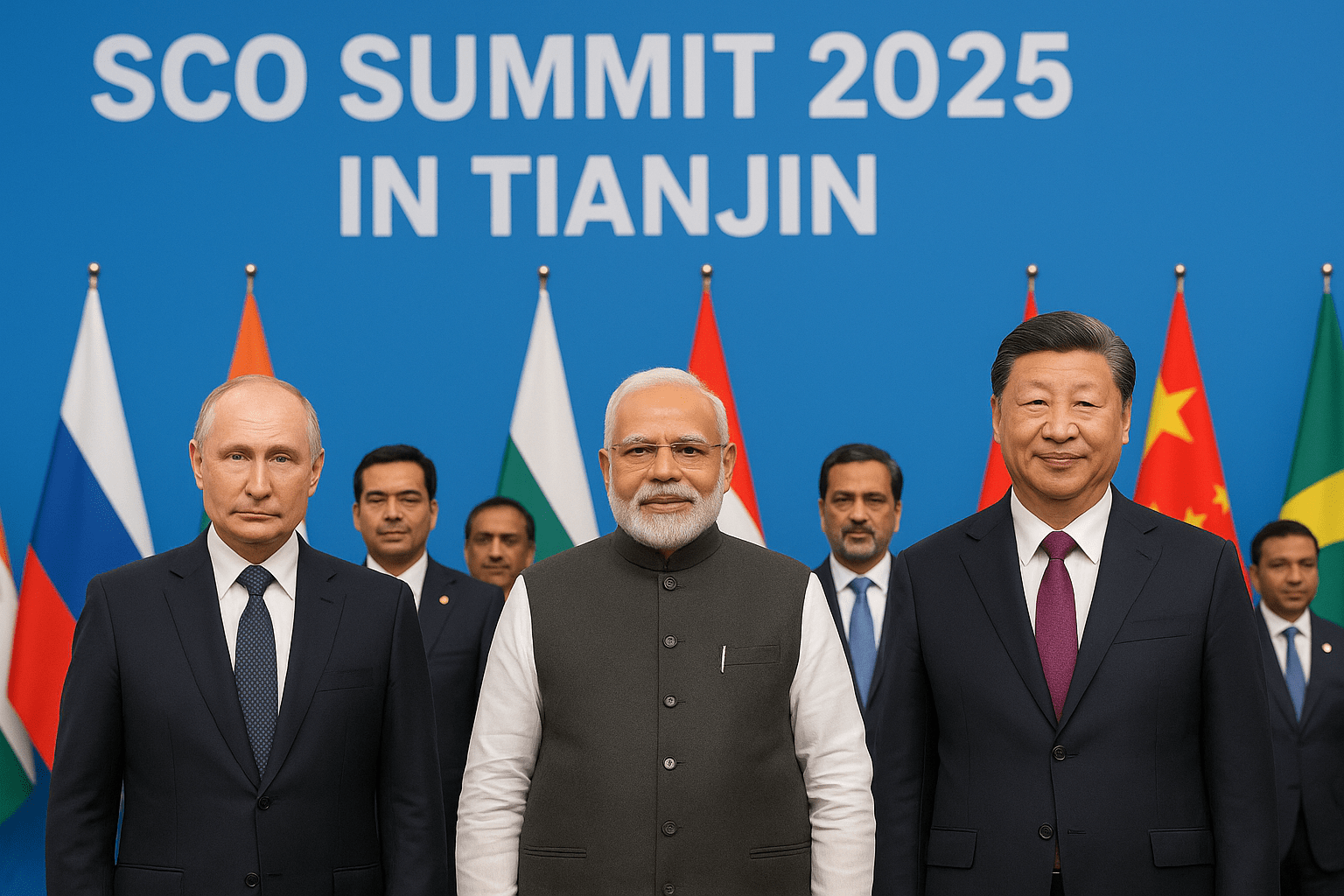|
Getting your Trinity Audio player ready... |
China is gearing up to host one of the most significant multilateral gatherings of 2025 as the Shanghai Cooperation Organization (SCO) Summit is set to take place in Tianjin on August 31 and September 1. The event will bring together leaders and representatives from over 20 countries, alongside the participation of nine major international organizations. With global heavyweights such as Russian President Vladimir Putin, Indian Prime Minister Narendra Modi, and Chinese President Xi Jinping confirmed to attend, the summit underscores its rising importance in shaping the future of Eurasian cooperation, regional security, and global diplomacy.

High-Level Global Participation
According to Chinese Vice Foreign Minister Liu Bin, preparations for the SCO Summit 2025 in Tianjin are in full swing. He confirmed that apart from Putin, Modi, and Xi, the summit will see the attendance of Iranian President Masoud Pezeshkian, Turkish President Recep Tayyip Erdoğan, Pakistani Deputy Prime Minister Ishaq Dar, and Malaysian Prime Minister Anwar Ibrahim. Additionally, United Nations Secretary-General António Guterres is also expected to participate, alongside heads of other international organizations, making this a truly global event.
Liu Bin further highlighted that China will unveil new initiatives to strengthen the SCO, a regional alliance increasingly recognized for its role in strategic partnerships, security collaboration, and economic cooperation. A key highlight of the summit will be the Tianjin Declaration, a joint statement to be signed by all member states, reflecting the organization’s collective stance on pressing international and regional issues.
India and China in Focus
A significant spotlight of this summit will be on Prime Minister Narendra Modi’s presence in Tianjin. China has repeatedly emphasized that Modi’s participation will be a milestone event not only for the Shanghai Cooperation Organisation but also for the India–China relationship, which remains one of the most crucial yet complex bilateral ties in Asia.
Speaking to reporters, Chinese Ambassador to India Xu Feihong underlined that Modi’s visit will hold “great importance” for both the SCO and the future of India–China relations. He confirmed that joint working groups from both nations are collaborating closely to ensure the visit is successful.
Xu’s remarks come shortly after Chinese Foreign Minister Wang Yi visited New Delhi for the 24th round of border talks with India’s National Security Advisor Ajit Doval. The discussions led to a 10-point consensus on sensitive border issues, including agreements to form two specialized working groups one focused on demarcating disputed areas and the other dedicated to managing frontier regions. The progress achieved in these talks is expected to add further depth to Modi’s participation at the Tianjin Summit.
Why the SCO Summit 2025 Matters
The SCO Summit 2025 in Tianjin is far more than a diplomatic gathering it is an event with global strategic consequences. Founded in 2001, the Shanghai Cooperation Organisation has steadily grown from a regional forum to a powerful multilateral platform that includes major global players like China, Russia, India, Pakistan, and Iran. With its members accounting for nearly 40% of the world’s population and over 20% of global GDP, the SCO represents a formidable bloc in world affairs.
The summit comes at a time when the geopolitical landscape is undergoing dramatic shifts. With tensions high in several parts of the world, the SCO provides a platform for dialogue, cooperation, and conflict management. Key themes on the agenda include:
- Regional Security: Strengthening mechanisms to counter terrorism, separatism, and extremism.
- Economic Cooperation: Enhancing connectivity, energy partnerships, and trade integration across Eurasia.
- Diplomatic Engagement: Facilitating stronger ties among member states and expanding partnerships with observer nations and dialogue partners.
- Strategic Partnerships: Building trust among major powers like India, China, and Russia, which often find themselves at odds on global issues.
China’s Strategic Role
Hosting the summit in Tianjin provides China with an opportunity to project itself as a stabilizing global leader. President Xi Jinping is expected to announce new initiatives designed to bolster the SCO’s influence on the world stage. Analysts believe these could include measures for enhanced digital cooperation, regional infrastructure development, and expanded security frameworks.
Moreover, Xi’s presence alongside Putin and Modi signals the importance of the China–Russia–India triangle, a critical axis for global geopolitics. With Western sanctions against Russia continuing, Moscow is likely to leverage the summit to deepen its ties with Beijing and New Delhi.
The Significance of Modi’s Visit
For India, the SCO Summit 2025 comes at a critical juncture. Despite ongoing border tensions with China and geopolitical pressures from the West, India continues to balance its foreign policy by engaging with platforms like the SCO. Modi’s visit to Tianjin reflects New Delhi’s intent to strengthen India’s foreign policy on oil, trade, and security while maintaining a strategic partnership with Russia and a working relationship with China.
Ambassador Xu described Modi’s presence as a “very significant event” for both nations. With bilateral discussions already making headway on border management, Modi’s participation could signal a thaw or at least a new framework for engagement between India and China.
Broader Implications for Eurasia
The SCO Summit 2025 in Tianjin is not just about bilateral relations. The inclusion of leaders like Erdoğan, Ibrahim, and Pezeshkian highlights the organization’s role as a broad-based Eurasian forum. With countries from Central Asia, South Asia, the Middle East, and even Southeast Asia actively engaging, the SCO continues to expand its relevance.
The presence of UN Secretary-General António Guterres further elevates the summit’s standing. It reflects the recognition that the SCO is no longer just a regional grouping but a global stakeholder in peace, stability, and development.







